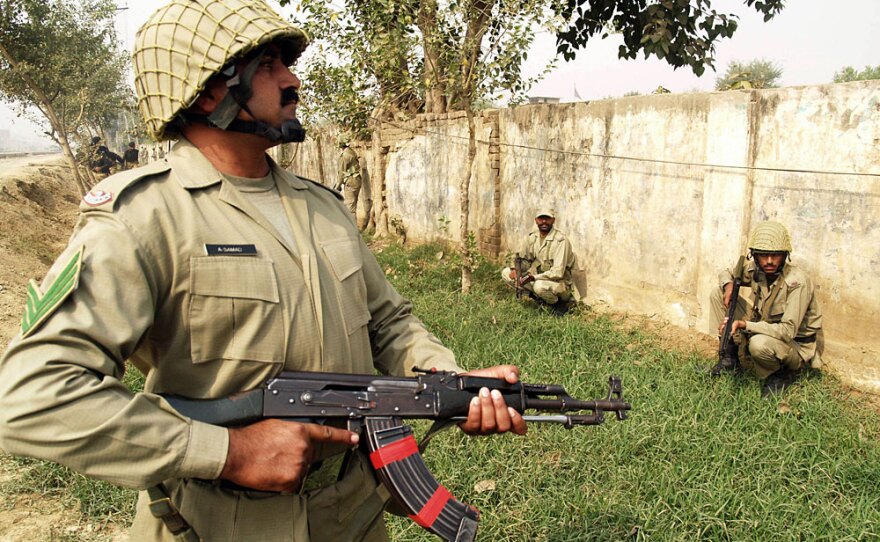Pakistan is believed to have at least 60 nuclear warheads. The country's leaders say the security systems guarding them are "foolproof."
But a wave of terrorist attacks sweeping the country has raised serious questions. Within the past week, armed extremists raided a police commando training center and laid siege to the headquarters of Pakistan's army.
Could they also infiltrate a nuclear facility?
Matthew Bunn, a Harvard University professor and an expert on nuclear proliferation, says there is cause for worry.
Militants dressed in army uniforms attacked Pakistan's army headquarters, and they had forged identification that allowed them to get through a checkpoint.
"This is exactly the kind of thing one often worries about in a potential attack on a nuclear facility," Bunn says.
In the wake of the attacks, the Obama administration expressed its support for Pakistani authorities and cautioned against undue concern. After the army headquarters attack, Secretary of State Hillary Clinton said the U.S. has "confidence in the Pakistani government and the military's control over nuclear weapons."
Clinton added that the attack is evidence that extremists are "increasingly threatening the authority of the state." But she said there is no evidence they will take over.
Still, what's worrying about events this past week is the prospect that terrorists might not have to take over in Pakistan to get their hands on a nuclear weapon.
There are plausible scenarios under which extremists don't take over the country but are able to obtain major components for a nuclear weapon, says Sam Faddis, who ran the weapons of mass destruction unit for the CIA's Counterterrorism Center until last year. The biggest potential threat is extremists already within Pakistan's military or intelligence agencies — in other words, an inside job, Faddis says.
Another point to consider is where these recent attacks took place.
The army headquarters is located just outside the Pakistani capital, Islamabad. The raids on police facilities occurred in the country's cultural capital, Lahore.
Bunn sees insurgents going out of their way to demonstrate they can operate well beyond the tribal areas along the border with Afghanistan and attack secure sites in the country's heartland. That is worrisome, he says, because that is where the nuclear weapons facilities are — or at least where the U.S. thinks they are.
In a speech in May, CIA Director Leon Panetta admitted that the agency isn't quite sure. "Obviously, we do try to understand where all of these [nuclear weapons] are located. We don't have, frankly, the intelligence to know where they all are located. But we do track the Pakistanis," he said.
Panetta added that the Pakistanis have "a pretty secure approach" to protecting their weapons.
Pakistani officials stress that in recent years they have taken steps to store warheads separately from missiles and detonators, and tightened background checks for workers at nuclear sites.
Then again, says Faddis, the ex-CIA official, if the Pakistanis had been asked last week about security at their army headquarters, they probably would have said it is foolproof, too.
Copyright 2022 NPR. To see more, visit https://www.npr.org. 9(MDAzMjM2NDYzMDEyMzc1Njk5NjAxNzY3OQ001))







